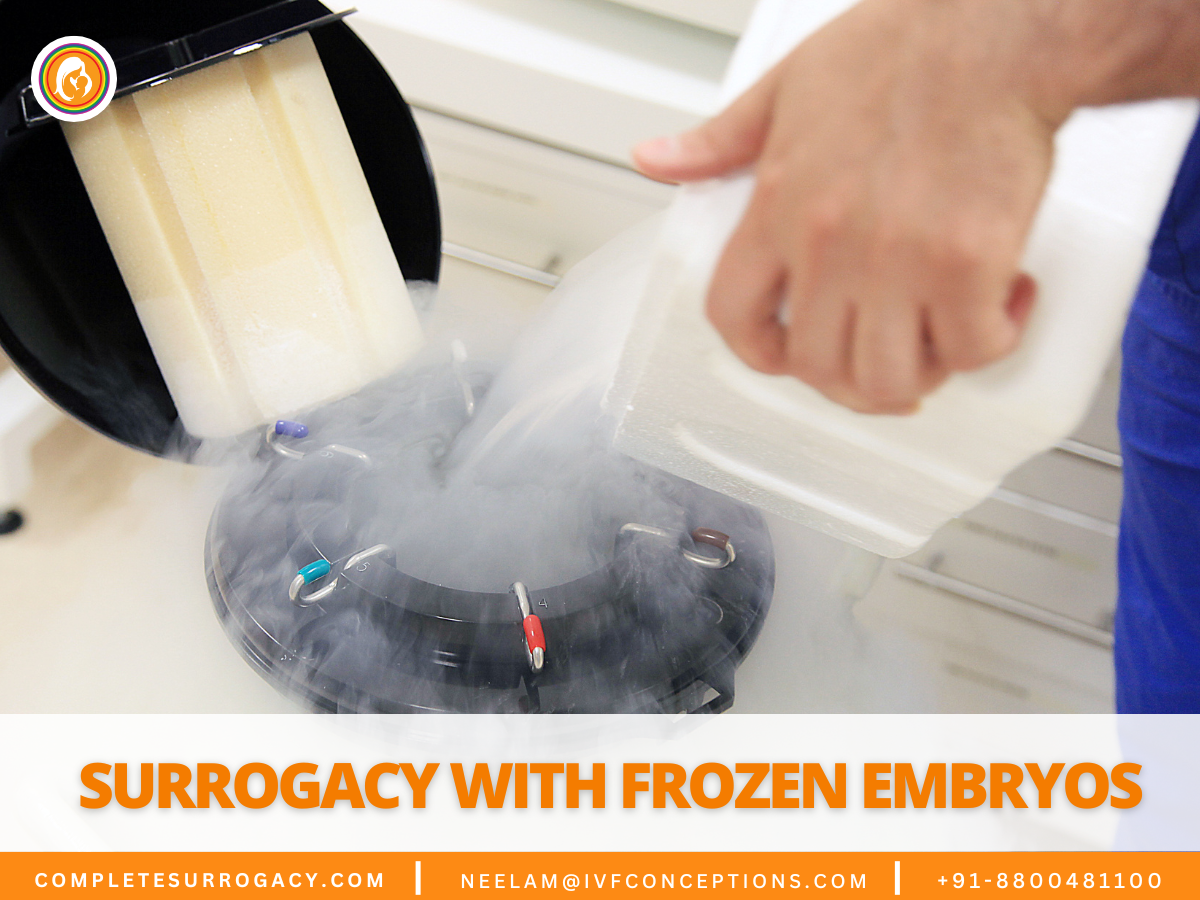Surrogacy with Frozen Embryo: The Definitive Guide for Intended Parents

Surrogacy with Frozen Embryo has emerged as a game-changer in the world of assisted reproductive technology (ART). This approach allows intended parents to use cryopreserved embryos created through in vitro fertilization (IVF), offering a flexible and effective solution for those facing fertility challenges. By utilizing frozen embryo transfer (FET), intended parents can plan their surrogacy journey at the most suitable time while ensuring a high success rate.
One of the key advantages of frozen embryo surrogacy is that it allows parents to use embryos that were previously created, reducing the need for additional egg retrieval cycles. This method is particularly beneficial for those who have undergone egg freezing for fertility preservation or have leftover embryos from previous IVF cycles. With advancements in embryo cryopreservation technology, the survival rate of thawed embryos has significantly improved, making this process more reliable and efficient.
- Book an online appointment: Get a free online consultation.
- Call\W:+91-8800481100 Email:neelam@ivfconceptions.com
In this comprehensive guide, we’ll explore the intricacies of surrogacy with frozen embryos, including the process, benefits, costs, and legal considerations. By understanding these key aspects, intended parents can make informed decisions and navigate the surrogacy journey with confidence.
More Resources to Read:
Infertility Treatment and Surrogacy Process
9 Factors To Improve IVF Pregnancy Rate
International Surrogacy Options Worldwide
Surrogacy Guide for Surrogate Mothers
Benefits of Surrogacy with Frozen Embryos
Surrogacy with frozen embryos offers several significant advantages over traditional methods. Below are some key benefits that make this option appealing to intended parents:
1. Cost-Effectiveness
- Lower IVF Costs: The initial IVF cycle is already complete, reducing the need for multiple fresh cycles.
- Storage Flexibility: Frozen embryos can be stored for years, allowing intended parents to plan their surrogacy journey without time constraints.
2. Increased Flexibility
- Timing Coordination: Embryos can be thawed and transferred at a time that best suits the surrogate and intended parents.
- Controlled Environment: The process allows for optimal preparation of the surrogate, increasing the chances of successful implantation.
3. High Survival and Success Rates
- Thawing Survival: Frozen embryos have a high survival rate during thawing, ensuring better chances of a successful pregnancy.
- Comparable Success Rates: Success rates of frozen embryo transfers are comparable to fresh transfers, making this option equally effective.
Cost of Surrogacy with Frozen Embryos

Understanding the financial aspects of surrogacy with frozen embryos is crucial for planning. Costs can vary based on several factors, including location, medical expenses, and agency fees. Below is a table outlining the potential costs associated with surrogacy using frozen embryos:
| Cost Component | Estimated Range (USD) |
| Embryo Creation & Freezing (IVF) | $10,000 – $15,000 |
| Cryo-Shipping of Embryos | $2,000 – $5,000 |
| Surrogacy Agency Fees | $20,000 – $40,000 |
| Legal Fees (Contracts, Parental Rights) | $5,000 – $10,000 |
| Surrogate Compensation | $30,000 – $50,000 |
| Medical & Prenatal Care for Surrogate | $10,000 – $20,000 |
| Additional Expenses (Travel, etc.) | $5,000 – $10,000 |
Note: Costs vary by country and specific circumstances.
Why Consider Frozen Embryos for Surrogacy?
Choosing frozen embryos for surrogacy offers distinct advantages, particularly in terms of success rates and flexibility. Here’s why intended parents might prefer this option:
1. Higher Success Rates
- Optimized Conditions: The ability to carefully prepare the surrogate for implantation increases the likelihood of success.
- Proven Viability: Studies show frozen embryos often have success rates equal to or higher than fresh embryos due to the meticulous preparation involved.
2. Reduced Timeline
- No Need for Fresh IVF: By using pre-existing frozen embryos, intended parents can bypass the time-consuming process of fresh embryo creation.
- Streamlined Process: The surrogacy journey is faster and more predictable, with fewer variables affecting timing.

Choosing the Right Surrogacy Agency
Selecting a surrogacy agency that aligns with your needs is crucial for a smooth and successful journey. Consider the following when choosing an agency:
| Factors to Consider | Importance |
| Experience with Frozen Embryo Surrogacy | Agencies with a proven track record offer expertise and reliability. |
| Comprehensive Services | Ensure the agency provides full support, including legal guidance and emotional support. |
| Cost Transparency | The agency should clearly outline all fees to avoid unexpected expenses. |
| Cryo-Shipping Experience | Choose agencies familiar with coordinating cryo-shipments for smooth logistics. |
Legal and Ethical Considerations for frozen embryo surrogacy process
Navigating the legal landscape of surrogacy with frozen embryos can be complex. It’s important to understand the legal and ethical considerations involved:
- Consent: Ensure all parties—intended parents, donors, and the surrogate—have provided informed consent.
- Legal Contracts: Drafting clear, legally binding contracts is essential to outline the rights and responsibilities of each party.
- Parental Rights: Establishing parental rights through pre-birth or post-birth orders is crucial for legal security.
- Cryo-Shipping Regulations: Ensure compliance with all regulations and obtain necessary documentation for the cryo-shipment of embryos.
| Legal Considerations | Details |
| Contracts | Detailed agreements are essential to outline the rights and responsibilities of all parties involved. |
| Parental Rights | Legal parentage must be established, often requiring court orders, especially in international surrogacy. |
| Cryo-Shipping Documentation | Legal documentation is necessary for the transport of frozen embryos across borders. |
| Surrogate’s Rights | The surrogate’s rights, including her compensation and medical care, should be clearly defined and protected. |
It is highly recommended to work with an experienced reproductive attorney who specializes in surrogacy to ensure all legal aspects are thoroughly addressed.

The Process of Surrogacy with Frozen Embryos
Here’s a step-by-step breakdown of how surrogacy with frozen embryos typically works:
- Embryo Creation & Freezing:
- IVF Process: Eggs and sperm from the intended parents or donors are combined through IVF.
- Cryopreservation: The resulting embryos are frozen using vitrification for future use.
- Selecting a Surrogate:
- Matching: Intended parents choose a surrogate through an agency.
- Legal Agreements: Contracts are signed to protect all parties involved.
- Thawing and Transfer:
- Embryo Thawing: Embryos are thawed and prepared for transfer.
- Embryo Transfer: The thawed embryo is transferred into the surrogate’s uterus.
- Pregnancy & Birth:
- Monitoring: The surrogate undergoes regular medical check-ups to ensure a healthy pregnancy.
- Birth: The surrogate delivers the baby, and legal steps are taken to establish the intended parents’ rights.
Success Rates of Surrogacy with Frozen Embryos
Success rates of surrogacy with frozen embryos can be comparable to, or even higher than, those with fresh embryos. The success of frozen embryo transfers (FET) largely depends on the quality of the embryos and the surrogate’s health.
| Success Factor | Details |
| Embryo Quality | High-quality embryos have better survival rates post-thaw and higher implantation success. |
| Surrogate’s Health | A healthy surrogate with no underlying conditions significantly increases the likelihood of a successful pregnancy. |
| Clinic Expertise | The experience and expertise of the fertility clinic handling the FET play a critical role. |
Studies have shown that success rates for frozen embryo transfers can range between 30% to 50% per cycle, which is similar to fresh embryo transfers.
More Resources to Read:
Surrogacy Guide for Surrogate Mothers
Surrogacy Guide for Intended Parents
How does the surrogacy process work
Conclusion
Surrogacy with frozen embryos offers a viable and flexible option for individuals and couples looking to start or expand their families. With proper planning, legal guidance, and the right support, this method can be a fulfilling path to parenthood. Whether you’re just beginning your surrogacy journey or exploring your options, understanding the benefits and complexities of using frozen embryos will empower you to make informed decisions.
If you’d like to learn more about IVF, Egg Donation, or surrogacy services globally, check out the rest of our website at Complete Surrogacy Agency. We offer legally secure and affordable surrogacy consulting services for FREE.
Complete Surrogacy: Your Trusted Partner in International Surrogacy
At Complete Surrogacy, we have over 15 years of experience in international surrogacy, guiding 4,000+ intended parents worldwide. We provide safe, ethical, and affordable surrogacy solutions for single parents, LGBTQ+ couples, and heterosexual couples.
As members of EFS and ESHRE, we adhere to the highest ethical and professional standards. Our expert team is committed to providing accurate, compassionate, and transparent guidance, ensuring a legally secure and smooth journey to parenthood.
Let us help you build your family with trust, care, and integrity.
Get in touch for one FREE Surrogacy Consultancy!

FAQs for frozen embryo surrogacy process
1. What is the difference between surrogacy with frozen embryos and traditional surrogacy?
Surrogacy with frozen embryos involves using embryos created via IVF and stored for future use, whereas traditional surrogacy typically involves the surrogate’s egg being fertilized. In frozen embryo surrogacy, the intended parents are the biological parents, unlike in traditional surrogacy.
2. What are the legal considerations in surrogacy with frozen embryos?
Legal considerations include ensuring all parties give informed consent, establishing clear legal contracts, and securing parental rights. Compliance with cryo-shipping regulations is also necessary when transporting embryos.
3. How are frozen embryos created and stored?
Frozen embryos are created through IVF by fertilizing eggs with sperm. The embryos are then cryopreserved using vitrification and stored in liquid nitrogen at extremely low temperatures until they are ready to be used in surrogacy.
4. What are the success rates of surrogacy with frozen embryos?
Success rates for frozen embryo transfers are generally comparable to fresh transfers, ranging from 30% to 50% per transfer cycle, depending on various factors such as embryo quality and the health of the surrogate.
This revised blog post is structured to be comprehensive, informative, and optimized for search engines, while also providing clear answers to potential questions that visitors might have. The addition of tables helps to organize information in a way that’s easy to scan and understand.

Author Bio: Neelam Chhagani is an International Surrogacy Expert with 15 years of experience in the fertility and surrogacy domain. As the founder of IVF Conceptions and Complete Surrogacy, she has guided over 4,000 intended parents worldwide on their surrogacy journey to parenthood. Recognized as a trusted authority, she specializes in holistic infertility solutions and third-party reproduction consulting.
Holding an MA in Counselling Psychology and a PGD in Mental Health, Neelam is a proud member of the European Fertility Society (EFS) and the European Society of Human Reproduction and Embryology (ESHRE). She is also a leading surrogacy blogger, providing valuable insights into ethical and practical surrogacy solutions.
Since 2010, committed to supporting ALL family types, Neelam has been passionate about helping intended parents grow their families with compassion, integrity, and a focus on secure and affordable surrogacy options Globally.
Learn more about Neelam:
https://www.ivfconceptions.com/neelam-chhagani-surrogacy-consultant/
https://www.linkedin.com/in/neelam-chhagani-92892229/















I was introduced to Neelam by a friend who worked with Neelam for surrogacy. Neelam is absolutely wonderful. I am a single male and the journey to fatherhood is not that easy. Neelam connected me to a program ideal for my circumstances. She was with me throughout the pregnancy providing advice and guidance along the way. I am so grateful I found her and am thrilled today that I have a beautiful daughter. I highly recommend Neelam to anyone who is on a journey to become a parent. Having a child has changed my world for the better. I wish others success with their own journey and recommend you connect with Neelam to find a path that is best for you.
SA (USA)